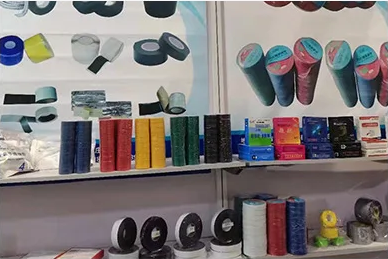The Importance of Tape for Electrical Insulation
In the realm of electrical engineering, safety and reliability are paramount. One essential component that plays a significant role in ensuring these attributes is electrical insulation tape. This seemingly simple product is critical in preventing electrical accidents, protecting equipment, and maintaining the integrity of electrical systems. This article explores the various types of electrical insulation tape, their applications, and the importance of using high-quality materials.
Types of Electrical Insulation Tape
Electrical insulation tape comes in various types, each designed to serve specific purposes. The most common materials used for insulation tape include PVC (polyvinyl chloride), rubber, and cloth.
1. PVC Tape This is the most widely used type of insulation tape. It is flexible, durable, and resistant to moisture, making it suitable for both indoor and outdoor applications. PVC tape is often used for wrapping wires, insulating electrical connections, and marking electrical circuits.
2. Rubber Tape Known for its superior insulating properties, rubber tape is ideal for high-voltage applications. It has an excellent stretchability and can conform to irregular shapes, creating a tight seal that prevents moisture ingress. Rubber tape is commonly used in underground cable repairs and splicing.
3. Cloth Tape This tape has a strong adhesive backing and is often used for bundling wires and cables. While it does not offer the same level of electrical insulation as PVC or rubber tape, it provides good mechanical protection and resistance to abrasion.
Applications of Electrical Insulation Tape
tape electrical insulation

Electrical insulation tape is used in a broad range of applications across various industries. In residential wiring, it is often applied to secure wire connections and prevent short circuits. In industrial settings, electrical tape is used to maintain the safety of high-voltage equipment and machinery. Furthermore, automotive industries utilize insulation tape for wiring, ensuring that vehicle electrical systems operate safely under varied conditions.
Additionally, electrical tape is vital for repair work. When a wire is exposed or damaged, using insulation tape can provide a quick and effective solution, preventing potential hazards. It allows electricians to safely make temporary repairs while facilitating the planning of permanent fixes.
The Importance of Quality
While electrical insulation tape may seem like a simple tool, the quality of the tape you choose can significantly impact safety and performance. Low-quality tapes may not provide adequate insulation, increasing the risk of electrical accidents. They may also degrade over time, losing their adhesive properties and exposing wires to moisture and other environmental factors.
When selecting electrical tape, it is important to consider factors such as temperature resistance, voltage rating, and durability. Reputable brands often provide specifications that help consumers make informed decisions based on the specific requirements of their projects.
Conclusion
Electrical insulation tape is a crucial component in the world of electrical engineering and everyday applications. Whether you are wiring a new installation, performing repairs, or ensuring the safety of electrical systems, the right insulation tape can make all the difference. By understanding the types available and their respective applications, as well as the importance of choosing high-quality products, individuals and professionals can enhance safety and reliability in their electrical projects. As technology evolves, so too will the materials and capabilities of electrical insulation tape—ensuring that it remains a vital resource for years to come.
-
XIANGFAN Rubber Tape-Ultimate Solutions for All Your Insulation NeedsNewsJun.24,2025
-
XIANGFAN Rubber Tape-Protection for Industrial and Residential ApplicationsNewsJun.24,2025
-
XIANGFAN Rubber Tape: Superior Safety and Sealing for Demanding EnvironmentsNewsJun.24,2025
-
XIANGFAN Rubber Tape: Reliable Solutions for Every Electrical ChallengeNewsJun.24,2025
-
XIANGFAN Electrical & Industrial Tape: Powering Reliability Across IndustriesNewsJun.24,2025
-
XIANGFAN Electrical & Industrial Tape: Excellence in Every ApplicationNewsJun.24,2025
